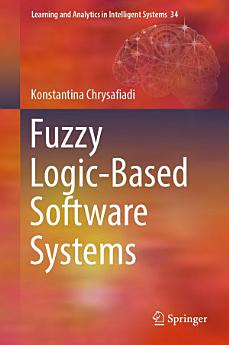Fuzzy Logic-Based Software Systems
oct. 2023 · Learning and Analytics in Intelligent Systems Livre 34 · Springer Nature
E-book
177
Pages
reportLes notes et avis ne sont pas vérifiés. En savoir plus
À propos de cet e-book
This book aims to provide information about significant advances of Fuzzy Logic in software systems to researchers, scientists, educators, students, software engineers and developers. In particular, this book explains how Fuzzy Logic, can be used in software systems to automatically predict, model, decide, diagnose, recommend etc.. In more details, Fuzzy Logic is an artificial intelligent technique that is ideal for successfully addressing, , the uncertainty, imprecision and vagueness that exist in many diverse scientific and technological areas. It was introduced by Lotfi A. Zadeh of the University of California at Berkeley, as a methodology for computing with words. This ability of Fuzzy Logic allows the representation of imprecise and vague data in a more realistic way. Therefore, Fuzzy Logic-based systems can simulate the human reasoning and decision-making processes, addressing the human subjectivity. Fuzzy Logic-based software systems are referred to any software that concerns an automated program or process that is used in everyday life, like heating or air-conditioning system, or in the scientific world, like a medical diagnostic system, which uses Fuzzy Logic in order to perform reasoning. A Fuzzy Logic-based system consists of three basic modules: Fuzzifier, Inference Engine and Defuzzifier. The Fuzzifier accepts as input numerical data and assigns them to fuzzy sets with some degree of membership, converting crisp data to fuzzy sets. The Inference Engine applies fuzzy rules over the defined fuzzy sets and produces outputs based on linguistic information. The Defuzzifier, converts fuzzy values into crisp values. The use of Fuzzy Logic in software systems constitutes a compelling and active research area in recent years, especially due to the increased interest in artificial intelligence. In the view of the above, this book presents thoroughly the Fuzzy Logic theory and the structure and operation of a Fuzzy Logic-based system. It also explains the role of Fuzzy Logic in artificial intelligence and smart applications, presenting how it can improve the efficiency and effectiveness of automatic processes and tasks. Furthermore, the book describes techniques of artificial intelligence with which the fuzzy logic is combined and how. Furthermore, this book presents several Fuzzy Logic-based software systems in the discipline of medicine, education, decision making and recommendation, natural language processing, automotive engineering and industry, heating, ventilation and air-conditioning, navigation, scheduling, network traffic and security. Thereby, this book can provide deep insights and valuable information not only to readers of computer science-related disciplines, but also to readers, who come from a variety of disciplines and are interesting in systems that perform tasks related to their discipline, in a more efficient way.
Donner une note à cet e-book
Dites-nous ce que vous en pensez.
Informations sur la lecture
Smartphones et tablettes
Installez l'application Google Play Livres pour Android et iPad ou iPhone. Elle se synchronise automatiquement avec votre compte et vous permet de lire des livres en ligne ou hors connexion, où que vous soyez.
Ordinateurs portables et de bureau
Vous pouvez écouter les livres audio achetés sur Google Play à l'aide du navigateur Web de votre ordinateur.
Liseuses et autres appareils
Pour lire sur des appareils e-Ink, comme les liseuses Kobo, vous devez télécharger un fichier et le transférer sur l'appareil en question. Suivez les instructions détaillées du Centre d'aide pour transférer les fichiers sur les liseuses compatibles.







